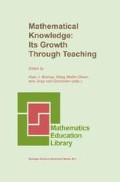Abstract
The classroom is a living place where complicated interactions take place between the teacher and the pupils. What is at stake is a certain mathematical knowledge. The pupils arrive in class in a certain state of knowledge and must reach another expected state of knowledge, under the teacher’s direction. Various factors act upon these relations — of a scientific, social, cultural, hierarchical, or personal order — often in contradictory ways. One of the functions of teacher training is to provide teachers with the means of recognizing those factors which they can influence, considering the constraints to which they are subject. Another point is to determine how they can manage these elements in order to obtain a desired result in the pupils’ learning.
Access this chapter
Tax calculation will be finalised at checkout
Purchases are for personal use only
Preview
Unable to display preview. Download preview PDF.
References
Artigue, M. and Douady, R.: 1986, ‘La didactique des mathématiques en France, émergence d’un champ scientifique’, Revue Française de Pédagogie 76, 69–88.
Artigue, M. and Robinet, J.: 1982, ‘Conceptions du cercle chez des élèves de l’école élémentaire (7–9 ans)’, Recherches en Didactique des Mathématiques 3.1, 5–64.
Bachelard, G.: 1977, La formation de l’esprit scientifique,Vrin, Paris, 10e éd.
Bishop, A.J.: 1980, ‘Classroom conditions for learning Mathematics’, Proceedings of PME 4, Berkeley, California.
Boero, P.: 1989, ‘Mathematical Literacy for all, Experiences and Problems’, plenary lecture, Proceedings of PME 13, Paris, 52–76.
Brousseau, G.: 1986, Fondements et méthodes de la didactique des mathématiques’, Recherches en Didactique des Mathématiques 7.2, 33–115.
Douady, R. 1985, ‘The Interplay between Different Settings; Tool-Object Dialectic, Proceedings of PME 9, Noordwijkerhout, Vol. 2, 33–52.
Douady, R.: and Perrin, M.J.: 1989, ‘Un processus d’apprentissage du concept d’aire de surface plane’, Educational Studies in Mathematics 20, 387–424.
Hoyles, C. and Noss, R.: 1988, ‘Children Working in a Structure Logo Environment: From Doing to Understanding’, Recherches en Didactique des Mathématiques 8, 1/2 131–174.
Joshua, M.A. and Joshua, S.: 1988/1989, ‘Les fonctions didactiques de l’expérimental dans l’enseignement scientifique’, Recherches en Didactique des Mathématiques, première partie, 83, 231–266, deuxième partie, 9.1 5–30.
Perret-Clermont, A.N.: 1979, La construction de l’intelligence dans l’interaction sociale. Peter Lang, Berne.
Piaget, J.: 1975, L’équilibration des structures cognitives, PUF, Paris.
Robert, A. and Tenaud, I.: 1989, ‘Une expérience d’enseignement de la géométrie en Terminale C’, (section scientifique, élèves de 17–18 ans), Recherches en Didactique des Mathématiques 9.131–70.
Schoenfeld, A.: 1985, Mathematical Problem Solving, Academic Press, Orlando.
Editor information
Editors and Affiliations
Rights and permissions
Copyright information
© 1991 Springer Science+Business Media Dordrecht
About this chapter
Cite this chapter
Douady, R. (1991). Tool, Object, Setting, Window: Elements for Analysing and Constructing Didactical Situations in Mathematics. In: Bishop, A.J., Mellin-Olsen, S., Van Dormolen, J. (eds) Mathematical Knowledge: Its Growth Through Teaching. Mathematics Education Library, vol 10. Springer, Dordrecht. https://doi.org/10.1007/978-94-017-2195-0_6
Download citation
DOI: https://doi.org/10.1007/978-94-017-2195-0_6
Publisher Name: Springer, Dordrecht
Print ISBN: 978-90-481-4095-4
Online ISBN: 978-94-017-2195-0
eBook Packages: Springer Book Archive

